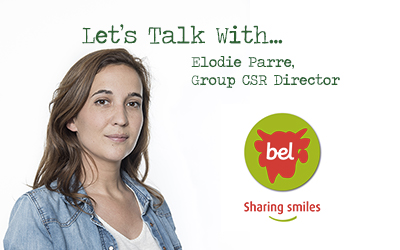“Sustainability is innovation spelt wrong” once said Hannah Jones, VP Sustainable Business and Innovation at Nike. Today, let’s uncover how this statement is applied at Bel with Elodie Parre, Group Corporate Social Responsibility (CSR) Director. For those not knowing, Bel is a global manufacturer of single-serving cheese portions under iconic brands such as the Laughing Cow, Babybel or Kiri.
How did Bel’s engagement towards sustainability start?
Bel is a 150-year old family-owned group with 12,700 collaborators, 30 subsidiaries and 32 manufacturing sites around the world. Needless to say, our company looks ahead ! Our mindset has always been to care about future generations. We started working on CSR over 15 years ago, with a first focus on saving energy and water. But we realized our responsibility did not end at our plants’ gate. We needed to include our retailers, our suppliers, in short, all our ecosystem in our approach. We then decided to deeply transform the way we were doing business using positive innovation.
How did you manage to implement this new approach?
First by setting up a new governance system based on a CSR Executive Committee meeting regularly (2 to 3 times a year) and in multi-functional steering committees dedicated to our priority programs. Our team has 3 people dedicated to CSR 100% around three key values: Care, Dare and Commit. Then, over a year ago, we gathered a community of CSR ‘hackers’ and ‘activists’ across different levels and functions in the company. The idea was to speed up the change in-house in particular using design thinking or the intervention of external experts to feed our actions. We came up with a clear innovation strategy based on four pillars (see below). End 2017, we finalized our roadmap till 2025 with quantified targets and a scorecard.

What did positive innovation bring to Bel?
80% of the environmental impact of our value chain happens at the farm. So, for instance, as part of Sustainable farming, we co-created the Bel group’s global charter for a sustainable dairy upstream sector in partnership with the WWF and our farmers. We looked at the content of dairy cows rations, the access to grazing pastures, the overall animal welfare and the environmental footprint. We also defined a set average price for one liter of milk and clear objectives for all our dairy pools. All this ensures sustainable supply of the best milk quality for our products.
We also addressed packaging issues to reduce our environmental footprint. This is quite complex as it is protecting the product and impacts the shelf life. Here, our goal is to use 100% recyclable and/or biodegradable materials by 2025. The packaging of our Leerdammer slices already contains 24% recycled plastics.
Positive innovation is also at work with our Bel Explorer team addressing the Bottom Of the Pyramid. They developed the ‘Sharing Cities‘ program with a completely differentiating business model based on street vendor networks. Today, the program accounts for 7,000 street vendors in 7 cities.
What are the key success factors to implement such a program?
First and foremost, our CEO, Antoine Fiévet, totally believes in the approach. It is key that all our employees can see and feel the commitment of our top management.
Then, CSR is truly at the heart of all the functions within Bel, in particular marketing is very much on board with the approach.
Our CSR scorecard with clear objectives for 2025 and action plans also really helps remaining focused.
In the end, we need change management to be successful long term as we ask our teams to review their way of working. Therefore, we spend a lot of time with our communication team to highlight our progress with concrete examples.
Indeed, it looks like Bel knows how to spell innovation!
To know more, watch the video:
